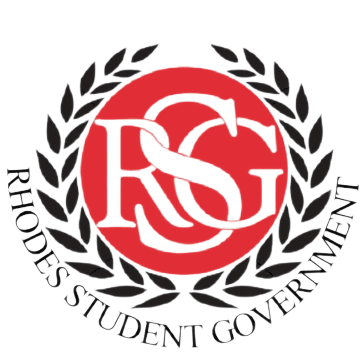
Rhodes Student Government (RSG) is composed of five student governmental bodies: Allocations and Student Organizations Commission (ASOC), Community Standards Council (CSC), Honor Council (HC), Rhodes Activities Board (RAB), and Senate. Each president is a voting member of the Executive Cabinet in addition to leading their organization.
Rhodes Student Government (RSG) President: Johnathan Q. Burch
- Student Trustee (Campus Life)
The RSG President is responsible for representing the needs, concerns, and climate of the student body to the administration, Board of Trustees, alumni, and greater Rhodes community. They oversee all RSG bodies through regular meetings with the executive cabinet and serve as a student trustee on the Board of Trustees. They are elected by a student body-wide vote.
Rhodes Student Government (RSG) Vice President: Jeb M. Mathis
The RSG Vice President serves as Chair of the Student Senate, overseeing and aiding in senators' initiatives and chairing weekly meetings held at 7 pm in Buckman 110. They are elected by a student body-wide vote.
Rhodes Student Government (RSG) Chief of Staff: Srijith Jawabnavis
The RSG Chief of Staff serves as an administrator for RSG business and supports the President's initiatives throughout the year. The Chief of Staff is selected by the RSG President.
Student Trustee: Kathryn M. Githinji (Finance)
Student Trustee: Travis J. Martin (Academic Affairs)
Student Trustees are responsible for attending three annual meetings of the Rhodes College Board of Trustees and accurately representing the interests and priorities of the student body. Each Student Trustee serves on one standing committee of the Board of Trustees. They are elected by a student body-wide vote.
Honor Council (HC) President: Laurel G. Phillips
Community Standards Council (CSC) President: Drew A. Murphy
The Honor Council and Community Standards Council Presidents oversee the hearing process for concerns related to the Honor Code and Code of Conduct. They are elected from within each organization. Each class has 4 Honor Council representatives and 3 Community Standards Council Representatives.
Allocations (ASOC) Commissioner: Caden A. Foy
The ASOC Commissioner is responsible for allocating money from the Student Activities Fund to student organization events and activities. They are elected from within the organization, and there are 12 voting members on the Commission.
Rhodes Activities Board (RAB) President: Muna N. Ogwo
Rhodes Activities Board (RAB) hosts many events open to the entire student body, including the annual Homecoming and Rites of Spring concert weekends. The RAB President is elected from within the organization and students are selected as members by application.
Rhodes Student Government (RSG) Elections Commissioner: Andrew R. Johnston
The Elections Commissioner is the chair of the Election Commission of the Rhodes Student Government. They serve a renewable 1-year term. The position of Election Commissioner is appointed by the RSG
President and is confirmed by the Senate for the appointment to take effect. Their role includes but is not limited to supporting and aiding the election commissioner in conducting their duties.
Foundations Curriculum Faculty Committee Student Representative: Sohan C. Patel
Diversity & Equity Faculty Committee Student Representative: Ariyana P. Muesse
Educational Program Faculty Committee Student Representative: Amelia J. Rursch
These student appointees are accountable to the Student Senate, which means that they are expected to regularly update the Rhodes Student Senate and/or the Rhodes Student Government (RSG) Executive Cabinet on all information that can be shared.
Rhodes College’s faculty governance structure is organized to ensure shared decision-making and responsibility across the institution. It includes standing bodies such as the full faculty, academic departments, and committees handling curriculum, tenure, and standards. Faculty collaborate with administration on committees for advising, technology, and scholarships, and consult through roles like department chairs, administrative committees, and liaison appointments. This structure supports faculty involvement in both ongoing governance and specific institutional initiatives. This governance structure ensures that faculty have a substantive role in decision-making, fostering a collaborative environment that balances shared responsibility and expertise.